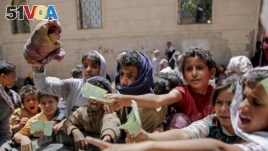May 9, 2017
Yemen's two-year conflict between the Houthi rebels and the country's elected government, supported by a Saudi-led coalition, has left the people of Yemen, in the words of Norwegian Humanitarian leader Jen Egeland, “facing a famine of Biblical proportion”.
According to the United Nations, since the conflict broke out in March 2015, nearly 4,800 civilians have been killed, and more than 8,200 others have been injured. At the same time, more than 3 million Yemenis have been displaced since the start of the crisis and some 70 percent of the country—or nearly 19 million people—is in need of humanitarian assistance. Today, over 17 million Yemenis are at risk of starvation.

The fighting has caused an economic collapse and severely restricted the importation of food, medicine, and fuel.Even before the crisis, Yemen relied on imports for 90 percent of its food and most of its fuel and medicines. This means that until the fighting stops, there is little chance Yemen will be able to stave off the looming humanitarian catastrophe on its own.
The United States is one of Yemen's largest donors of aid. In late April, the U.S. government announced nearly 94 million dollars in additional humanitarian assistance to help the people of Yemen. This brings the total U.S. humanitarian contribution to Yemen to nearly 526 million dollars since the 2016 fiscal year.
The funds will go toward food and clean drinking water to vulnerable families, as well as nutrition treatment for malnourished children. It will also provide hygiene kits to fight the spread of disease, as well as lifesaving medical supplies and training for health care workers. There will also be emergency shelter for those who had been displaced by the fighting.
Conflict is the primary driver of this humanitarian crisis. The United States remains committed to providing humanitarian support to the people of Yemen, while we work to end the conflict through a comprehensive peace agreement.
The United States calls upon all parties to ensure unimpeded access for commercial and humanitarian goods throughout the country. We also urge other humanitarian donors to increase their level of support during this critical time of need.